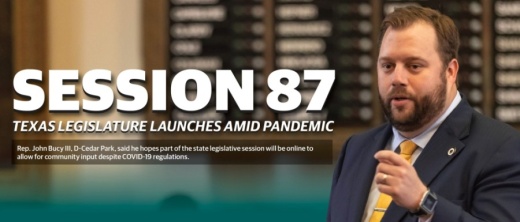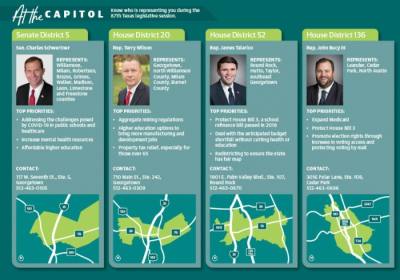The largest task the legislators will have to complete is setting a budget that will carry the state through the following two years. Made up of 31 senators and 150 House members, the biennial Texas Legislature began Jan. 12, and the biggest obstacle will be addressing the increasing costs of the coronavirus pandemic.
Texas received approximately $11 billion in federal coronavirus relief funding.
So far, Texas has allocated money for housing and legal assistance for those facing eviction and to local jurisdictions that did not receive direct allocation from the federal government, according to the governor’s office. But local elected officials said many additional relief efforts will need to be funded, including in education and health care.
“[COVID-19 has] been a challenge to all areas of government, but those two areas in particular—our health care system and our public schools—are foremost on my mind about how we can assist them, and hopefully refine them to make them better and more efficient, and repair some of the damage done by COVID,” Sen. Charles Schwertner, R-Georgetown, said.
Schwertner added that he believed another priority discussion topic will be the governor’s emergency powers, which was tested during this pandemic. He said he thinks in the future the Legislature should have the ability to reconvene in emergency times like a pandemic.
COVID-19 will also highlight some logistical challenges in conducting a session, Rep. John Bucy III, D-Cedar Park, said.
For example, part of the legislation process is to hear public input on various proposed bills, but the state Capitol has been closed to the public since March. Bucy said as both chambers set new rules at the start of the session, he hopes it will incorporate virtual avenues to allow for public participation.
“We cannot legislate solely behind closed doors; we have to have public access,” Bucy said. “I want to incorporate virtual so we can be as safe as possible, but also have good testing and safety standards of those coming in [to the Capitol].”
Overall, session priorities as related to the budget are often set by Gov. Greg Abbott, but as of press time those had not been announced.
However, Rep. Terry Wilson, R-Georgetown, said based on discussions, he believed the top priorities for the session will be public health, public education and public safety.
“As we focus on our legislative priorities, we need to make sure that, on health and safety, there is a detailed plan for distribution [of funds] in the long term,” Wilson said.
Redrawing districts
Beyond the budget, one of the key decisions made this session will be redistricting, the process of redrawing district boundaries to guarantee equal voter representation through equal, or equivalent, population counts, according to the Texas Comptroller of Public Accounts.
Conducting the 2020 census—from which redistricting data is derived—saw several delays due to the coronavirus pandemic.
On Dec. 30, the Census Bureau announced that it would miss its Dec. 31 deadline to present the data to the White House. As of press time, it said it planned to deliver the data by “early 2021.”
With this, local elected officials said they still hope the state will receive the data around April, but with a May 31 deadline to end the state legislative session, they said they believe a special session is expected to be called over the summer to focus on redistricting. According to the Texas constitution, a special session can last up to 30 days, however a second special session can be called if more time is still needed.
In addition, Williamson County is likely to gain a third full representative due to its growth.
At the moment, there are three state representatives whose districts include Williamson County: Rep. James Talarico, D-Round Rock, representing the east of the county including Hutto, Taylor and parts of south Georgetown; Bucy, representing the west of the county including Leander and North Austin; and Wilson, representing the north of the county as well as parts of Burnet and Milam counties.
With the increase in population to the area, local elected officials said they believe the county will receive a third representative dedicated to Williamson County or possibly more, something that is important to note as it gives Williamson County more of a voice at the state level, said Emily Sydnor, Southwestern University assistant professor of political science.
Sydnor said the two representatives located solely in Williamson County—Talarico and Bucy—are Democrats who won their re-election bids by relatively close margins and may face tougher challenges in future elections if district lines are redrawn to secure Republican holding.
Because of this, she said the impacts of redistricting will be interesting to see in the coming elections as the county’s demographics also continue to change.
“With a Republican majority in the Legislature, we are likely to see partisan motivations for the ways in which they draw those boundaries in order to maintain that majority,” she said, adding this would also be the case if Democrats were in the majority.
Redistricting occurs at the county and local level as well, potentially impacting every position from county commissioner to city council members and school board members.
Williamson County Commissioners Cynthia Long and Valerie Covey, and George Strebel with Williamson County Graphical Information Systems, are leading the charge for redistricting at the county level.
When concerns about gerrymandering, or the manipulation of boundaries to favor one party, were brought up during a November county commissioners meeting, Covey assured the public that would not occur in Williamson County. Covey, who was part of redistricting efforts in 2010, said it was a smooth process in working with data experts to draw lines legally.
She added there are several rules they have to follow as far as how lines are drawn and ensuring representation at the state level also falls in line.
Other priorities
During the 140-day session, legislators also take advantage of passing or maintaining bills and laws of personal interest.
For example, Schwertner, who represents the entire county as well as nine others east of Williamson, said he is prioritizing mental health resources, particularly in education. He also wants to reduce the cost of higher education to which he submitted a bill—Senate Bill 235—in December that would cap student fees at their current level for one year and prohibit any future increases from exceeding the rate of inflation unless approved by a majority vote of the student body.
“It is important that students have a say in how quickly and by how much fees are raised, as student fees are a less obvious but significant and growing portion of higher education costs,” he said at that time.
For Talarico, the continued funding of House Bill 3, a sweeping school finance bill that passed in June 2019, will continue to be his top priority. The bill sought to decrease the burden of school finance on taxpayers with the state providing more money for education and teacher pay increases instead. However, HB 3 was only funded through the biennium and would need to be refunded in the upcoming session to continue.
Talarico said this will play a big role in finalizing the budget.
“There will be a fight in the Legislature on how we close that gap in our state budget, and I have made a pledge that I won’t support a budget that cuts health or education,” Talarico said. “We need to find the money elsewhere.”
For Bucy, other priorities include the expansion of Medicaid, the protection of HB 3, and the protection of voting rights and access.
He said he is also in support of the George Floyd Act, which would ban chokeholds and limit police use of force, as well as women’s and LGBTQ rights.
“Unfortunately, there’s been a war on women and a war on our friends in the LGBTQ community, so I’ll continue to fight any bills that may come forward [against them],” Bucy said.
Wilson said he plans to focus on additional higher education offerings to include those that would bring more manufacturing and development to the state, regulations on aggregate mining operations and any alternatives for tax relief, particularly for those over the age of 65.
“The state of Texas is a prosperous state,” Wilson said. “So as we address property taxes, we have to do it smart. It needs to be detailed, but we need to make sure that we’re protecting our most vulnerable, especially our senior citizens.”
While Williamson County state elected officials have ambitious plans this coming year, they are quick to acknowledge that it takes time and even several sessions before their bills may be passed, with Schwertner adding that the legislative process is designed to kill bills, not pass them.
“I think good legislation takes time to percolate, and people don’t realize that most things have to be really hashed out, not just during the session, but usually from prior sessions,” Schwertner said. “It is a difficult task to pass one bill, even if it’s a simple local bill that only affects a smaller area.”








